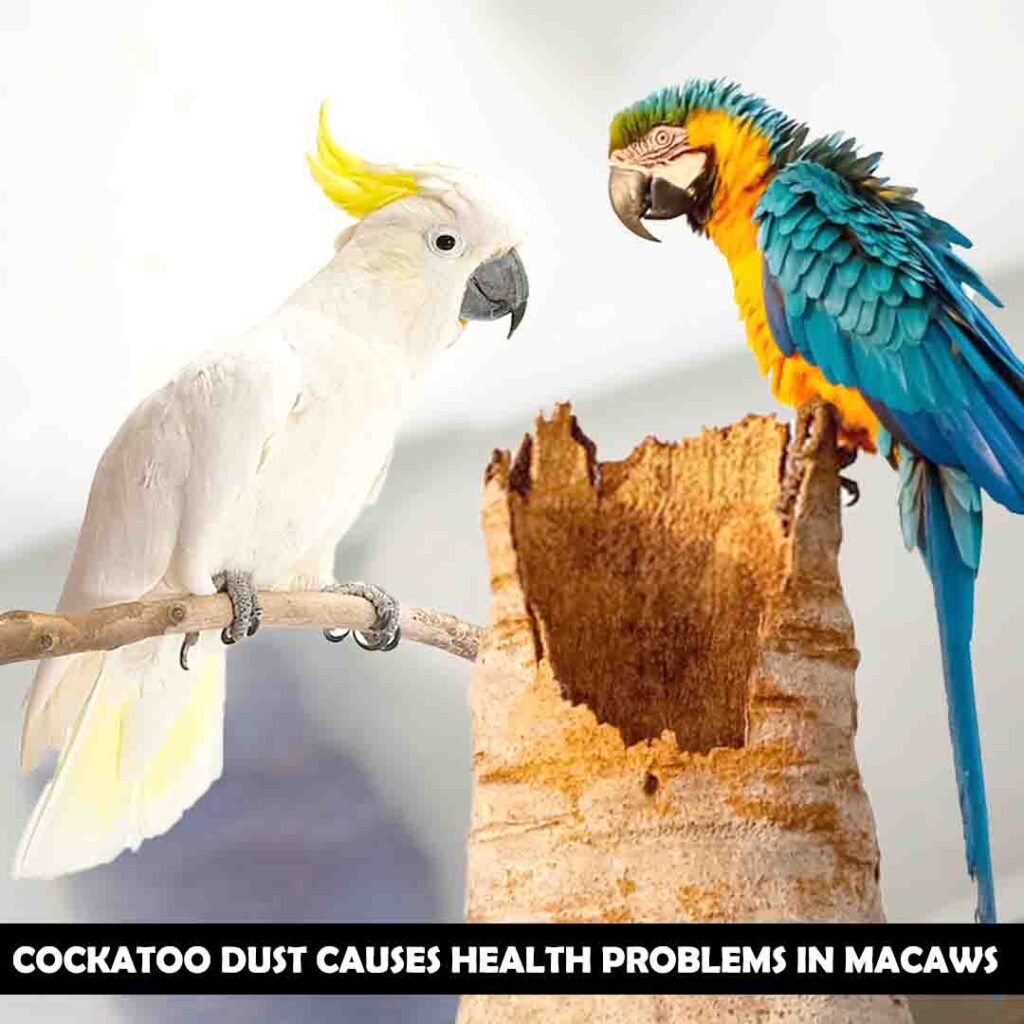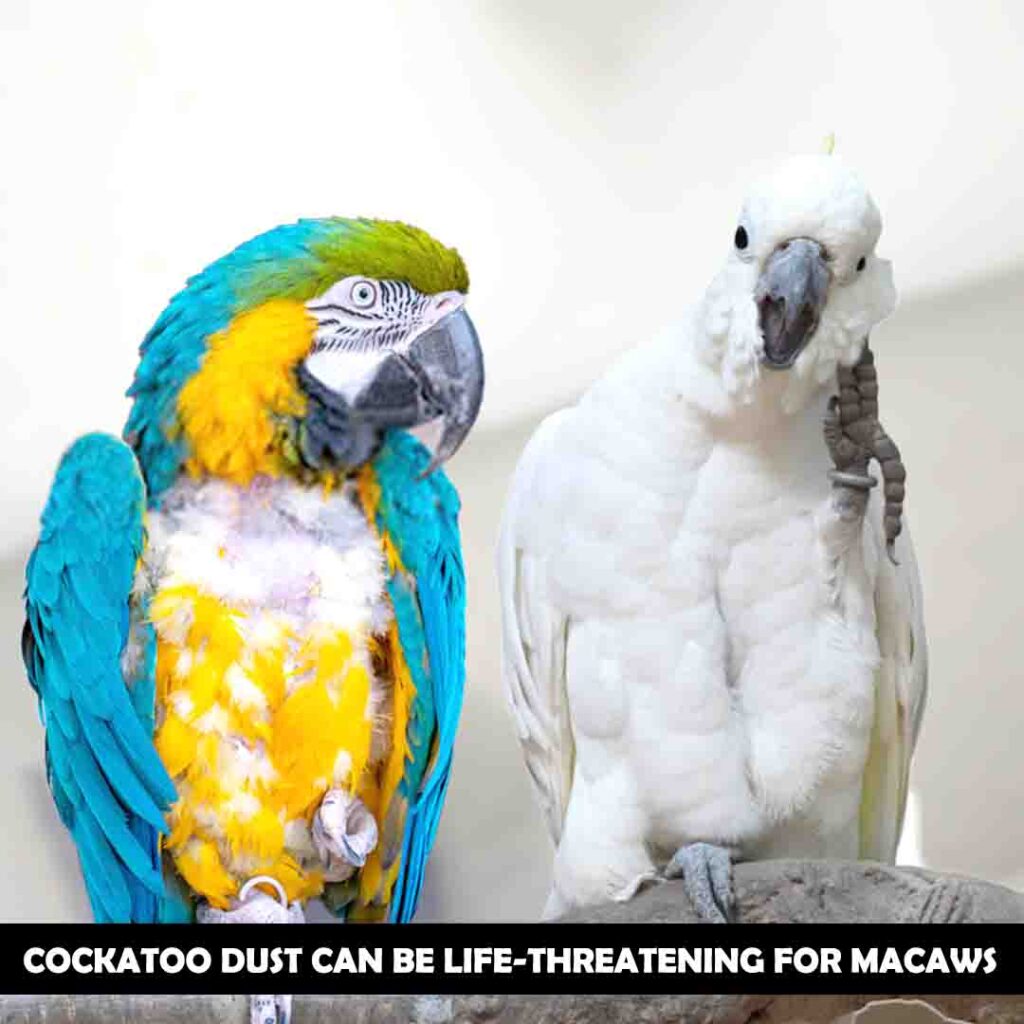Last Updated on February 17, 2022
Macaws are hypoallergenic. They are less allergic and are safe to keep as a pet. Let’s see how the macaws get allergic to cockatoo dust? What are the reasons? How should you keep them safe from cockatoo dust?
Macaws are sensitive to cockatoo dust because it can affect the macaw’s respiratory system if inhaled. Continuous exposure to cockatoo dust or dander can cause asthma, lung failure, and allergies in macaws. Daily baths and keeping the two different parrots in separate cages can resolve the issue.
In this article, you can learn the different ways to protect the macaws from cockatoo dust. Is it reasonable to keep them separate? Let’s start the discussion.
Macaws are sensitive to Cockatoo dust.
Macaws are very sensitive to cockatoo dust because the small particles affect their respiratory system in different ways. Sometimes, it directly affects someone near them and sometimes indirectly affects the macaws while playing with the toys or using the water dish.
Cockatoos produce dander from the keratin sheath of their feathers. It is made by preening glands that are very close to the skin. The white grey powder is produced when cockatoos groom.
Dust particles are tiny and can transfer to other places with air. The danger settles on the floor, feeding dishes, chewing toys, and on the clothes when you serve them. Naturally, macaws are very playful and spread the powder where they go.
The powder layers on the cockatoo feathers and gives them a glossy look. This dust is healthy for cockatoo, but it can create different health problems.
Cockatoo Dust Causes Health Problems
Cockatoo dust is harmful to macaws. Below are several health issues caused by cockatoo dust.
Blockage of air passage
Macaws have a very efficient respiratory system. Their air passage is tiny, and when they inhale in an environment containing cockatoo dust, they can have issues with respiration. The small powdery material blocks the air passage of macaws that leads to difficulty breathing.

But if they face the same situation constantly, it can be due to continuous blockage of the nasal passage. The macaw gets disturbed with severe health issues that shorten its lifespan.
Respiratory Hypersensitivity
When macaws are housed with cockatoos or near cockatoos, they get sick of respiratory hypersensitivity because of feather dander or dust produced from cockatoos’ feathers.
Lung diseases produce many allergic reactions like nasal discharge and difficulty breathing.
Macaw’s Asthma
Macaw’s asthma is also caused by cockatoo dust. Macaw’s respiratory system is very active. But if they live near cockatoos, the dust particles get stuck to the air passage of the macaws. It hinders the macaws from breathing safely.
Skin allergies
Cockatoo dust causes different allergic reactions in macaws, like skin rash, redness of eyes, swelling of eyes, coughing, sneezing, and runny nose. If they persist for a long time, macaws get sick and may need some treatment.
Although the allergies are not fatal and settle when you remove the cause of that allergy, a stressful condition may arise in the macaws that disturb their daily routine. It reduces the overall productivity and efficiency of macaws.
Considerations
Cockatoo dust is allergic for macaws and other pets or humans who contact the dust. Certain factors can be the reason for cockatoo dust sensitivity in macaws.

Macaw’s species are different and respond differently to cockatoo dust. Some are more allergic to macaws dust, while others are less sensitive. That’s why every macaw shows different signs of cockatoo dust allergy.
Macaw’s cleanliness is essential to keep it away from many diseases. The macaws who enjoy baths twice a week can have fewer chances of getting allergic to cockatoo dust.
Captive birds are dependent on the owner for everything. Macaws are very messy as they feed on various types of foods. The food also gets contaminated with feather dust if cockatoos are nearby and can cause allergic reactions in macaws if they eat that feed.
Environment plays a vital role in transmitting dust particles from one place to another. In the wild, macaws and other parrots have the opportunity to leave the place where they are not secure or not feeling well.
But in captivity, macaws can not leave where they are not feeling well. The owner should be responsible for keeping its pets comfortable and healthy.
If the cage environment is ventilated and airy, there are fewer chances of being sick from dust allergies. Poor ventilation can suffocate the macaws and does not allow the feather dust to move out of the cage.
If you have many pets sharing the same house, then the cleanliness of the environment and pets is necessary to keep them all safe from any allergy caused by cockatoo feather dust.
If the health of the macaw is not okay, then its low immunity will not fight against any other health issue. A diseased macaw is weak and cannot recover from any health issues.

A diseased macaw can die when exposed to cockatoo dust for a long time compared to a healthy macaw. A healthy macaw can fight against illness and recover soon.
Safety measures
You can keep your macaw safe from cockatoo dust by following the tips below.
- Keep the macaw clean. Give it a bath after every two days.
- Ensure regular cleaning of cage, feeding trays, and toys.
- Remove all droppings and leftover seeds, feed, or worn-out feathers to clean the cage.
- It would be very effective to keep the macaws and cockatoos in different cages. If this is not possible and all pets are closely bonded, supervise them carefully.
- The cage must be according to the size of your macaw.
- It must be airy and ventilated.
- Keep yourself clean while taking care of your pets. Wash your hands before and after dealing with the macaws and cockatoos.
- Wear a mask while handling the macaws and cockatoos.
- If a macaw shows, allergic signs keep it separate from the other pets until it recovers. Wear gloves and wash your hands after feeding or playing with the pets.
- Macaws are very playful and need a lot of attention, so you need to play with the macaw when they have taken a bath.
- Wooden floors are better than carpets because carpets can absorb dust.
- Blinds are better than curtains if you have a macaw and a cockatoo together in your house.
- You can use HEPA (High-efficiency particulate air) to keep the room free of macaw dust.

Conclusion
Hence, macaws are very sensitive to cockatoo dust depending upon the species, environment, how much dust is exposed, and the health of macaw. Not all macaws show similar allergic signs. Most macaws are allergic to cockatoo feather dust as the tiny particles of dust stick to the macaws’ air passage, leading to different respiratory problems. The cleanliness of macaws, cockatoos, and the cage can minimize the sensitivity of macaws towards cockatoo dust.
Also Read About: Are macaws Hypoallergenic?
Bilal is an aviculturist who loves to write in free time. His personal experience with bird care and breeding enables him to share valuable tips. So far, he has contributed more than 100 blogs to this site.
His goal is to promote bird-keeping and save endangered species.
